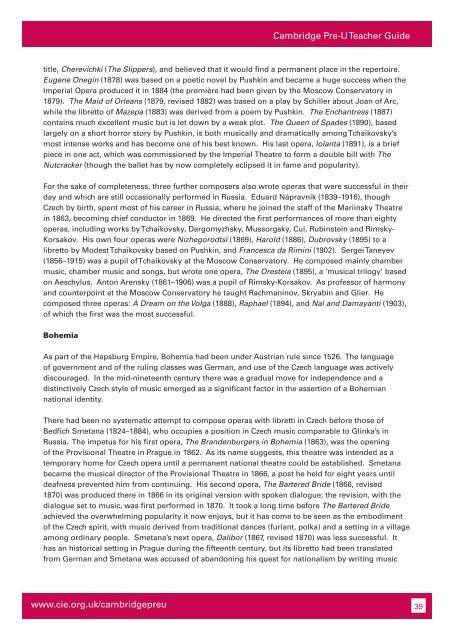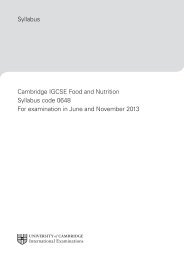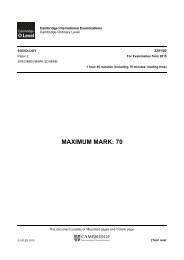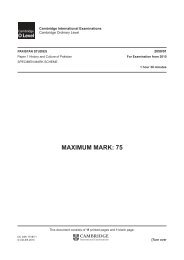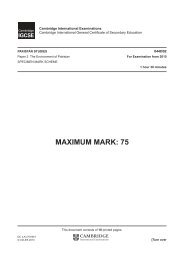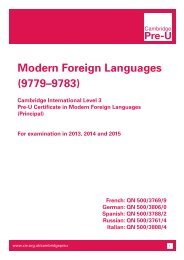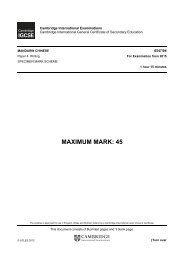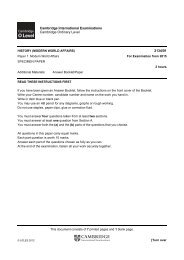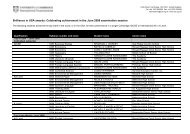Teacher's Guide Cambridge Pre-U MUSIC Available for teaching ...
Teacher's Guide Cambridge Pre-U MUSIC Available for teaching ...
Teacher's Guide Cambridge Pre-U MUSIC Available for teaching ...
Create successful ePaper yourself
Turn your PDF publications into a flip-book with our unique Google optimized e-Paper software.
<strong>Cambridge</strong> <strong>Pre</strong>-U Teacher <strong>Guide</strong><br />
title, Cherevichki (The Slippers), and believed that it would find a permanent place in the repertoire.<br />
Eugene Onegin (1878) was based on a poetic novel by Pushkin and became a huge success when the<br />
Imperial Opera produced it in 1884 (the première had been given by the Moscow Conservatory in<br />
1879). The Maid of Orleans (1879, revised 1882) was based on a play by Schiller about Joan of Arc,<br />
while the libretto of Mazepa (1883) was derived from a poem by Pushkin. The Enchantress (1887)<br />
contains much excellent music but is let down by a weak plot. The Queen of Spades (1890), based<br />
largely on a short horror story by Pushkin, is both musically and dramatically among Tchaikovsky’s<br />
most intense works and has become one of his best known. His last opera, Iolanta (1891), is a brief<br />
piece in one act, which was commissioned by the Imperial Theatre to <strong>for</strong>m a double bill with The<br />
Nutcracker (though the ballet has by now completely eclipsed it in fame and popularity).<br />
For the sake of completeness, three further composers also wrote operas that were successful in their<br />
day and which are still occasionally per<strong>for</strong>med in Russia. Eduard Nápravník (1839–1916), though<br />
Czech by birth, spent most of his career in Russia, where he joined the staff of the Mariinsky Theatre<br />
in 1863, becoming chief conductor in 1869. He directed the first per<strong>for</strong>mances of more than eighty<br />
operas, including works by Tchaikovsky, Dargomyzhsky, Mussorgsky, Cui, Rubinstein and Rimsky-<br />
Korsakov. His own four operas were Nizhegorodtsï (1869), Harold (1886), Dubrovsky (1895) to a<br />
libretto by Modest Tchaikovsky based on Pushkin, and Francesca da Rimini (1902). Sergei Taneyev<br />
(1856–1915) was a pupil of Tchaikovsky at the Moscow Conservatory. He composed mainly chamber<br />
music, chamber music and songs, but wrote one opera, The Oresteia (1895), a ‘musical trilogy’ based<br />
on Aeschylus. Anton Arensky (1861–1906) was a pupil of Rimsky-Korsakov. As professor of harmony<br />
and counterpoint at the Moscow Conservatory he taught Rachmaninov, Skryabin and Glier. He<br />
composed three operas: A Dream on the Volga (1888), Raphael (1894), and Nal and Damayanti (1903),<br />
of which the first was the most successful.<br />
Bohemia<br />
As part of the Hapsburg Empire, Bohemia had been under Austrian rule since 1526. The language<br />
of government and of the ruling classes was German, and use of the Czech language was actively<br />
discouraged. In the mid-nineteenth century there was a gradual move <strong>for</strong> independence and a<br />
distinctively Czech style of music emerged as a significant factor in the assertion of a Bohemian<br />
national identity.<br />
There had been no systematic attempt to compose operas with libretti in Czech be<strong>for</strong>e those of<br />
Bedřich Smetana (1824–1884), who occupies a position in Czech music comparable to Glinka’s in<br />
Russia. The impetus <strong>for</strong> his first opera, The Brandenburgers in Bohemia (1863), was the opening<br />
of the Provisional Theatre in Prague in 1862. As its name suggests, this theatre was intended as a<br />
temporary home <strong>for</strong> Czech opera until a permanent national theatre could be established. Smetana<br />
became the musical director of the Provisional Theatre in 1866, a post he held <strong>for</strong> eight years until<br />
deafness prevented him from continuing. His second opera, The Bartered Bride (1866, revised<br />
1870) was produced there in 1866 in its original version with spoken dialogue; the revision, with the<br />
dialogue set to music, was first per<strong>for</strong>med in 1870. It took a long time be<strong>for</strong>e The Bartered Bride<br />
achieved the overwhelming popularity it now enjoys, but it has come to be seen as the embodiment<br />
of the Czech spirit, with music derived from traditional dances (furiant, polka) and a setting in a village<br />
among ordinary people. Smetana’s next opera, Dalibor (1867, revised 1870) was less successful. It<br />
has an historical setting in Prague during the fifteenth century, but its libretto had been translated<br />
from German and Smetana was accused of abandoning his quest <strong>for</strong> nationalism by writing music<br />
www.cie.org.uk/cambridgepreu 39


